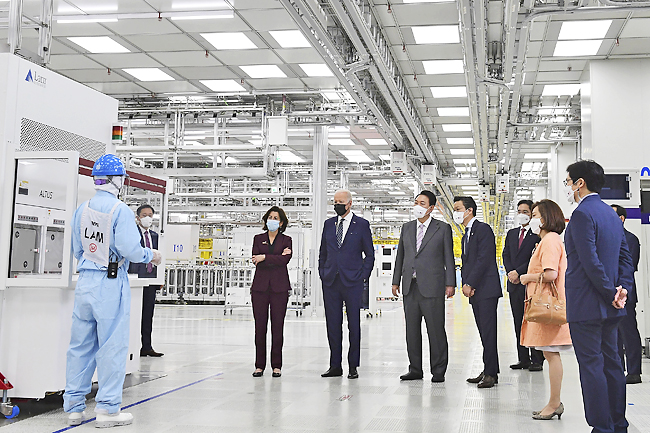SEOUL (AFP) – President Joe Biden has arrived in South Korea on his first Asia trip as United States (US) leader, aiming to cement economic and security ties with regional allies despite growing fears of a North Korean nuclear test.
His first stop on Friday was a massive Samsung semiconductor factory, where he received a warm welcome from South Korea’s new President Yoon Suk-yeol, with global supply chain issues topping the agenda.
Biden, in his first remarks since arriving in South Korea at the start of a trip meant to demonstrate US resolve to lead in Asia, said the two countries’ alliance was “a lynchpin of peace, stability and prosperity” in the world.
Speaking at the factory in Pyeongtaek alongside Yoon, Biden described the advanced semiconductors manufactured there as “a wonder of innovation” and crucial to the global economy.
The tiny, smart wafers “enable our modern lives” and are “the key to propelling us into the next era of humanity’s technological development”, he added.
Semiconductors – the microchips essential to most modern devices from phones to cars and high-tech weapons – are at the heart of a global supply chain slowdown that threatens to disrupt the world’s post-Covid economic recovery.
South Korea and the US need to work to “keep our supply chains resilient, reliable and secure”, Biden said.

“Putin’s brutal, unprovoked war in Ukraine has further spotlighted the need to secure our critical supply chain,” he said.
The US needs to ensure “our economic and our national security are not dependent on countries that don’t share our values”, he added.
Biden and Yoon are to hold talks and give a press conference in Seoul before attending a state dinner.
For the US leader, whose Democratic Party fears a possible trouncing in midterm elections in November, the issue is also an acute domestic political challenge, with Americans increasingly frustrated over rising prices and stuttering economic re-opening.
Ahead of the speech, Biden toured the huge Samsung plant, taking in lengthy presentations from staff clad in hazmat suits on the equipment used to produce semiconductors.
After a briefing from a US representative from a California company working with Samsung, Biden quipped: “Don’t forget to vote, Peter”.
Samsung employs about 20,000 people within the US and work is underway to build a new semiconductor plant in Texas, opening in 2024.
South Korea is a semiconductor powerhouse, supplying about 70 per cent of chips globally, Yoon said in his speech, asking Biden to take a “special interest” in South Korean chip firms.
Biden’s visit could help the two allies forge a new “economic and security alliance based on advanced technology and supply-chain cooperation”, Yoon said.
Semiconductors are now “something akin to a strategic commodity”, professor of Korean studies at the University of Oslo Vladimir Tikhonov told AFP.
China is trying to reduce reliance on US-influenced Dutch and Taiwanese suppliers, and the United States is trying to rebuild its domestic industry, he said.
Biden “needs Samsung’s collaboration in this regard”, he added.
Biden wants the trip to boost a years-long US pivot to Asia, where rising Chinese commercial and military power is undercutting Washington’s dominance – but it risks being overshadowed by North Korea’s nuclear ambitions.
“We remain concerned that the DPRK may attempt to undertake another provocation during the course of the president’s visit to Northeast Asia or in the days following,” State Department spokesman Ned Price said in Washington, referring to North Korea by its official acronym.
South Korean intelligence has warned that Pyongyang had recently completed preparations for a nuclear test, while Price said another possibility was a new launch of an intercontinental missile.



















































